I have not written a play since high school; I have not acted in a play (the last one being Charles Fuller's
A Soldier's Story) since right after college. In the main, I think of the theater (and performance) world with admiration, but apart; it fascinates me, but it is a distant and walled off garden. So it was very exciting to be invited to one of six writers to participate in a theater-based poetic experiment by poet
Patrick Durgin, the publisher of
Kenning Editions, which earlier this year released the wonderful
The Kenning Anthology of Poets Theater: 1945-1985, edited by
Kevin Killian and
David Brazil.
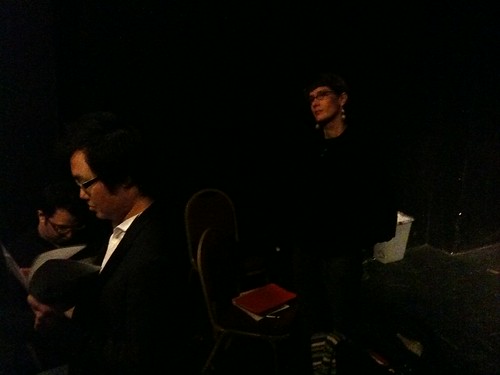 |
| Daniel, Tim and Leila on stage, before the performance |
The anthology includes most (I want to say nearly all) of the heavy hitters of the past 60 years' American avant-garde who wrote works that could be described as Poets theater, which Killian and Brazil define in their introduction, and which Patrick redefined for us. Among the anthology's leading lights:
New York School figures like
John Ashbery, Frank O'Hara, Kenneth Koch, James Schuyler, Barbara Guest;
San Francisco Renaissance poets like
Jack Spicer and
Robert Duncan; 60s and 70s innovators like
Jackson MacLow, Michael McClure, Diane DiPrima, and
Anne Waldman; Black Arts figures like
Amiri Baraka and S
onia Sanchez; conceptualist par excellence
Theresa Ha Kyung Cha; Language poetry paragons
Charles Bernstein, Bob Perelman, Bruce Andrews, and
Leslie Scalapino; and numerous others, among them favorites of mine
Russell Atkins, Lorenzo Thomas, Ntozake Shange, Johanna Drucker, Keith and
Rosmarie Waldrop, and
Kathy Acker. The book, which is 590 pages long, feels like the lightest library you have ever picked up, a long short-course in this vital strain of American artistic production, and I was delighted to have a reason to divert my attention to it, in preparation for the event.
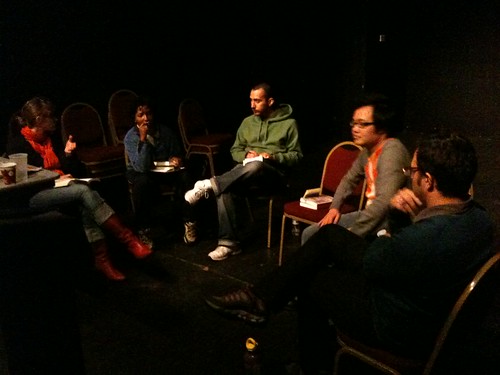 |
| The poets (l-r): Leila, Duriel, Jacob, Tim, Daniel |
One way of thinking about Poets Theater is as theater that follows poetic logic, and in which poetry, as the material and as the focus, is foregrounded. Another is anti-commercial, and, as participant
Tim Yu and Patrick both pointed out, often created by and for close friends, staged in living rooms or other intimate settings, without any pretense of professionalism. To put that another way, as poet, curator and critic
John Beer suggested in his panel comments that preceded our event, one might think of it as "embarrassed" and "inept," which is to say, artfully artless. Another member of that panel, playwright
Ruth Marggraf, linked it to "language playwriting." As it turned out, what we six writers (
Daniel Borzutzky, Duriel Harris, Jacob Saenz, Leila Wilson, and
Tim Yu), with the support of Patrick,
Valerie Johnson, Managing Editor of
Poetry Magazine, and
Ben Fuchsen and the technical team at
Oracle Theater, devised, was certainly a form of Poets Theater that managed to straddle all these definitions, without being, I'm proud to say, either "embarrassed" or "inept."
 |
| Patrick, as we were rehearsing |
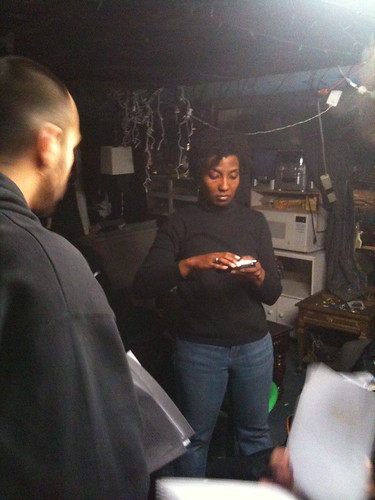 |
| Jacob and Duriel in the green/prop room, before the performance |
Our process was 48 hours long. We convened at Oracle on Saturday (December 4) morning, anthologies in hand, no preexisting scripts thought out. Patrick opened the morning with an introduction, as did Valerie, they had us sit together and hash out things, and after we did struggle a bit to figure out what we were going to do, Patrick suggested we take what we'd discussed, primarily the handful of texts in the anthology that served as touchstones or inspirations, and then individually draft pieces that we would talk about and try to integrate in an hour. This we all did. For me, several of the plays--Bruce Andrews'
Song #3, Amiri Baraka's
Dutchman, Ntozake Shange's
Spell #7 (which I'd acted in but not read since college), Theresa Cha's
From Vampyr and
Reveille Dans la Brume, and Kathy Acker's
The Birth of the Poet--assumed a central importance. I also had been inspired by a conversation with Patrick and Daniel when I arrived that morning, and, as I was reading Acker's and Baraka's work, thinking about the ongoing situation involving Julian Assange and the Wikileaks site revelations. So I came up with a playlet entitled
Assange Goes to the Mosque, drawing its title and heart directly from Scene 3 of Acker's play, and which included snippets of what I assume (though with Acker you can't be too sure) to be Arabic. It turned out that all of us ended up echoing one another in fascinating ways, so that the piece--and I say this not as bragadoccio but in amazement--was quite polyphonic, multilayered, and resonant in ways I don't think any of us expected.
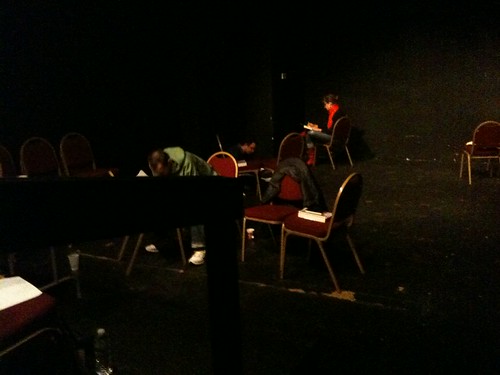 |
| Writing: Jacob, Daniel, Leila |
 |
| In the green/prop room (l-r), Duriel, Tim and Daniel |
We reconvened after lunch, and then walked each other through our different sections, working out with each other, and then with Ben and Valerie, and later the technical crew, how to put it all together. This was utterly enlightening for me, because the more that we configured the piece, the more I found myself wanting to simplify, to pare down, to clarify, not just my text, but its staging. Hearing the other poets' ideas, words, inventions, I found myself inspired anew. This lasted until 7 pm, and I must admit, I was completely wiped. I haven't felt that tired in a while. We met the next day (Sunday, December 5), at 12 pm, and it was then that we worked out all the remaining technical elements, from the lighting to video projections to props to audio recordings (which we did on my iPhone and transferred directly to my Mac, with a bit of Duriel's Sound Machine legerdemain). Then we had a run-through, pinned down our various ensemble roles and cues and readied and steadied ourselves for the performance, at 7:30 pm! Usually I am a like a shaken bottle of Dr. Pepper before any reading or performance, but I felt strangely calm. Part of it was knowing that I was in an ensemble, part of it was the amateur (in the best way) pitch of the production, and part of it was a real sense of confidence in what we had together devised. I'd had my battle with sleep (and a new zit) the night before. Now, I took a sips of water and was ready to break a leg.
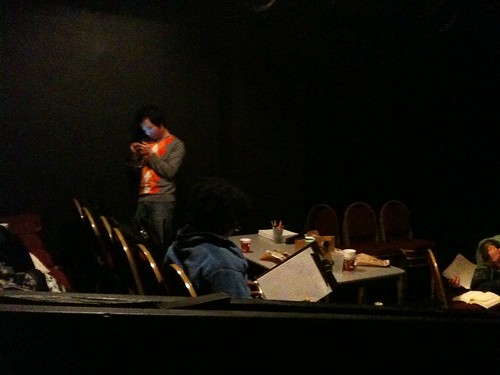 |
| Tim during down time, as Duriel studies her clipboard |
 |
| Tim blocking his section |
At 6 pm, John Beer, Ruth Margraff,
Don Share, and
Jennifer Karmin (both of whom added more definitions of Poets Theater, Jennifer even citing a conversation she had with Baraka himself about the anthology, his work, and more)
participated in a roundtable discussion that Patrick and Valerie moderated. It brimmed with insight about the history of American Poets Theater, how the audience might think of it, and how it related to other forms of theater and performance, and, as all of uspoet-performers gladly noted, set (or reset) expectations low enough that we really could have a good time. At 7:30 pm, we were on before a packed audience that included some of Chicago's finest poets, and the hour's worth of theater went by so quickly it was over almost as soon as we began. I even managed not to trip over anything, smash my glasses, which repeatedly almost fell off my face, or forget my cues, which included directing a red-gelled light during a scene involving Leila and Jacob, and moving a table out of and back into its little alcove. I was especially proud that I didn't drop and accidentally scatter my papers (for we each carried our scripts with us throughout) all over the stage, having done that at at least a few past poetry readings I've participated in. Bracketed by Lorenzo Thomas's two humorous, ironic and deeply conceptual and avant-garde playlets from the anthology, "Intolerance" and "The French Revolution," which Patrick intoned on a recording, all of our scenes flowed, with some serendipitous moments arising as a result. One involved sand that Daniel had included in one of the scenes he wrote. It left a small pile of sand and a cloud that was perfect when the one I drafted began, with a large image of a mosque projected on the back wall. Perhaps we had unconsciously thought of this, but to see it as it unfolded struck me as a perfect confluence.
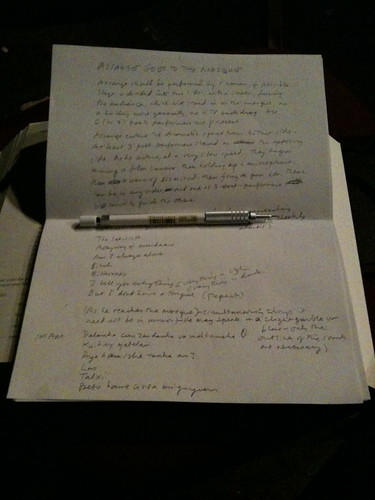 |
| My playlet section, in written draft form |
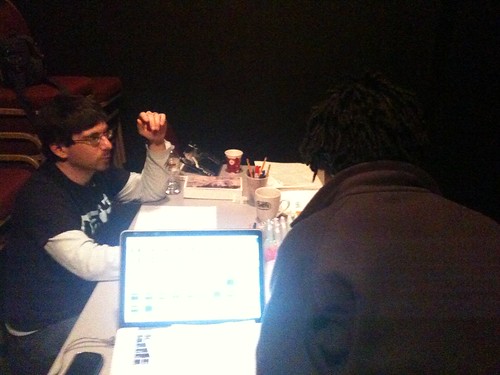 |
| Ben and Duriel discussing cues |
After the performance, we participated in a talk-back, one of the elements of Chicago-area events that I have found very useful, and the exchange was great. I was, I think, still on a bit of a high, though. We celebrated with remnants of the audience, and then it was all over. Like my fellow participants, I really appreciated the vision and generosity of Patrick and Valerie, and of the other poets, and I am now inspired to write more works falling in this vein, though interestingly enough I had thought about something dramatic in form--but not fiction or poetry--a few years ago, when
Tisa B. invited me to contribute a piece to a journal she was working on. I fumbled around with several things in my head, but the straightjacket of even experimental drama--and I have seen some language drama, to be sure--was such that I dithered, and ended up having nothing to send her. With this experience in my head and pocket, I know such things are possible, and have already gotten going....
 |
| Performance video screenshot of the "Chinese Restaurant" section |
 |
| Performance video screenshot of the "Hostage Girls" section |
 |
| Performance video screenshot of the "Mosque" section |
Please do pick up the anthology or urge a library near you to order it (or a bookstore to sell if it), and consider staging one of the plays--including those, like Jackson MacLow's or Lorenzo Thomas's, that seem to defy the very possibility of staging! And if you do, please let J's Theater know!























No comments:
Post a Comment